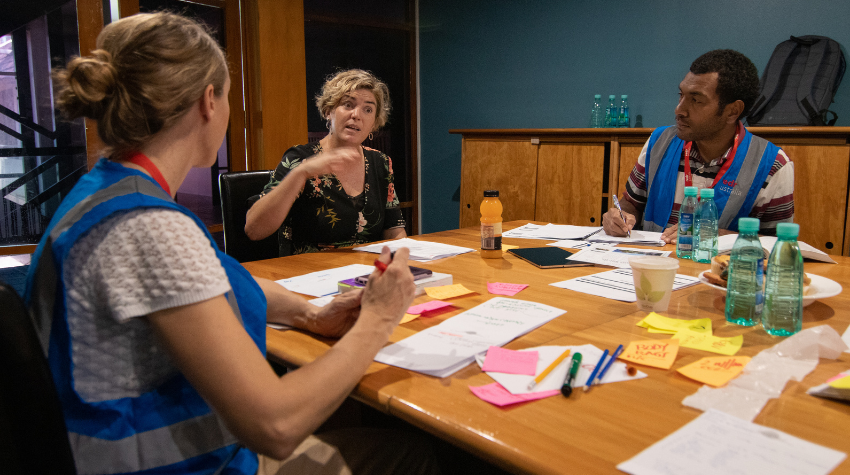However, 2020 was anything but a normal year. Cyclone Harold hit Australia’s island neighbours amidst a global wave of COVID-19 lockdowns and travel restrictions that suppressed humanitarian response capacity worldwide. RedR Australia characterised the sudden inability of the international humanitarian sector to deploy conventional levels of assistance as a ‘disaster within a disaster’. This included Australia’s work supporting the region’s climate-related disaster response capacity.
Heidi Winder, RedR Australia’s Regional Manager 2019 and 2021, says managing the escalating climate crisis in the midst of a global pandemic required learning some hard lessons. It required creativity, adaptability and an increased – but a very welcome – reliance on local humanitarian capacity.
Choosing to stay
While initially spared from the COVID-19 virus, the pandemic shock came in the form of severe economic strain, with massive job losses in nations that rely heavily on tourism. Heidi says, "This presented a real opportunity to find local solutions and deploy Pacific Island responders to surge to assist in climate response and recovery work throughout the region."
RedR Australia’s decision to retain and expand its Pacific deployments, strengthened the local cyclone response capability and capacity. Heidi explains, "We were already there working hand-in-hand and side-by-side, so we extended people who are already in there, with relevant relationships and were ready when the climate disaster hit."
"For example, Phillipe was with the Fiji Ministry of Agriculture, but he was deployed to support the Food and Agriculture Organisation. His story is compelling – he started right in the Tropical Cyclone Harold response in April 2020, so after the cyclone hit, he was then able to roll out the new preparedness plan and system for the next climate response."
Adapting to COVID
As a response to COVID, Heidi says, "We rapidly mobilised specialists from our roster to support. We offered support to our UN partners, and we were inundated with requests."
Rapid response and remote deployments posed new challenges in the dynamic pandemic environment. Heidi found that RedR’s agility was notable as many humanitarian organisations struggled and ceased operations due to issues related to managing risk and the high insurance costs required to stand and deliver. "RedR is small, specialised and able to adapt quickly to find fit-for-purpose solutions."
"We learned that we could scale down remote technical assistance to the Pacific unless the role was very specialised and the host organisation had the right systems in place to support remote work deployments."
The sudden logistics challenges of travel also meant that Heidi had to find new approaches to maximise the value of specialists already in the field.
"Our exceptional people were shared across partners. Usually we wouldn’t do that. Daniel was working with the International Planned Parenthood Federation (IPPF) responding to Tropical Cyclone Harold to work on monitoring and evaluation. After Tropical Cyclone Ana, he worked with the International Organisation for Migration as a monitoring and evaluation specialist, going out to the Lau group with the Ministers in Fiji." This unique deployment contributed to rapid action that supported Lau’s most vulnerable remote and climate crisis-affected communities.
Accelerated localisation
The year’s unique conditions saw the acceleration of localisation plans already in place as part of RedR Australia’s Localisation Strategy and Action Plan, as local specialists stepped up to provide humanitarian support to their communities and regional neighbours. For Heidi, witnessing localisation in action was the silver lining to the COVID experience and remains a lasting legacy of her work with RedR Australia, reflecting "this work bodes well for RedR’s future in the region."
"RedR Australia is headed towards being the big enabler for Pacific regional interoperability for humanitarian assistance. We’re offering a formalised avenue for Pacific Islanders to train, deploy and support climate action and risk management in their region. This approach is quicker, more efficient, and more appropriate given the cross-cultural and language skills needed to hit the ground running."
"That’s what we’re heading towards. Independent national localisation is not something achievable in the near future, but increased regional responses, where Pacific Islanders assist each other and are supported by international specialists when requested, is the name of the game. RedR is really forging forward with being able to share knowledge and build their systems for local humanitarian assistance. We are bringing organisations together and providing skills to Pacific Islanders and deploying them throughout the region."
The new RedR Australia Pacific Essentials of Humanitarian Practice training course was a big hit for local responders and aspiring humanitarian workers. According to Heidi, "The demand for simulated response training is high in the Pacific. There’s a real interest in participating in that, even just for readiness, not necessarily to get on the roster."
"People from the UN, people from regional organisations such as the Pacific Community (SPC), all sitting around the table doing a simulation of a cyclone in a made-up country called ‘Belia’. Then two months later, they actually have to respond and we are witnessing an increase in connectedness in the way graduates of this course are working in real-time responses."
"As the Pacific Island Communities now record COVID-19 in 11 countries and they head towards the season where tropical cyclones are most pronounced, we are proud of the high-quality people we have in the field but we all have so much work to do."
RedR Australia would like to thank everyone who generously donated to our Cyclone Yasa Appeal.


